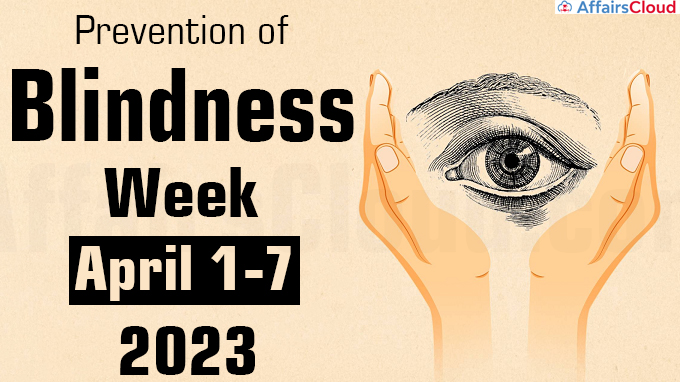 The Prevention of Blindness Week is annually observed across India from 1st to 7th April (the first week of April) to promote the prevention of blindness and to create awareness about the cause of blindness.
The Prevention of Blindness Week is annually observed across India from 1st to 7th April (the first week of April) to promote the prevention of blindness and to create awareness about the cause of blindness.
The day also supports individuals with visual impairments, and to promote access to eye care services.
- The National Society for the Prevention of Blindness-India (NSPB-I) coordinates Prevention of Blindness Week in India with the assistance of state and local branches.
Significance:
i.The Prevention of Blindness Week is observed to bring awareness towards various factors that can cause blindness.
ii.The week aims to educate the general public about various eye injuries, and visual impairments, and how to avoid, treat, and cure them.
GoI’s Efforts to Reduce the Prevalence of Blindness:
i.The government of India (GoI) launched the National Programme for Control of Blindness and Visual Impairment (NPCB&VI) in 1976 as a 100% centrally sponsored scheme (now 60:40 in all states and 90:10 in NE States) with the goal of reducing the prevalence of blindness to 0.3% by 2020.
ii.The National Health Policy (NHP) targets to reduce the prevalence of blindness to 0.25% by 2025.
Vision impairment:
i.The International Classification of Diseases 11 (2018) classifies vision impairment into 2 groups: Distance vision impairment and Near vision impairment.
ii.The leading causes of vision impairment are, age-related macular; degeneration; cataracts; diabetic retinopathy; glaucoma and uncorrected refractive errors.
WHO’s data on Visual impairment:
i.According to the data released by the World Health Organization(WHO), Globally, at least 2.2 billion people have a near or distance vision impairment.
ii.In around 1 billion of these cases, vision impairment could have been prevented or is yet to be addressed.
iii.Around 90% of the people with unaddressed vision impairment or blindness live in low- and middle-income countries (LMICs).




